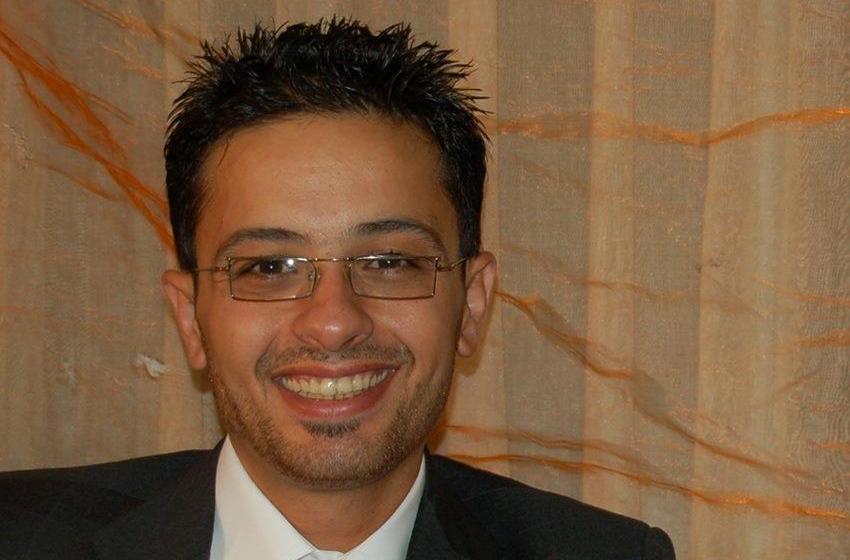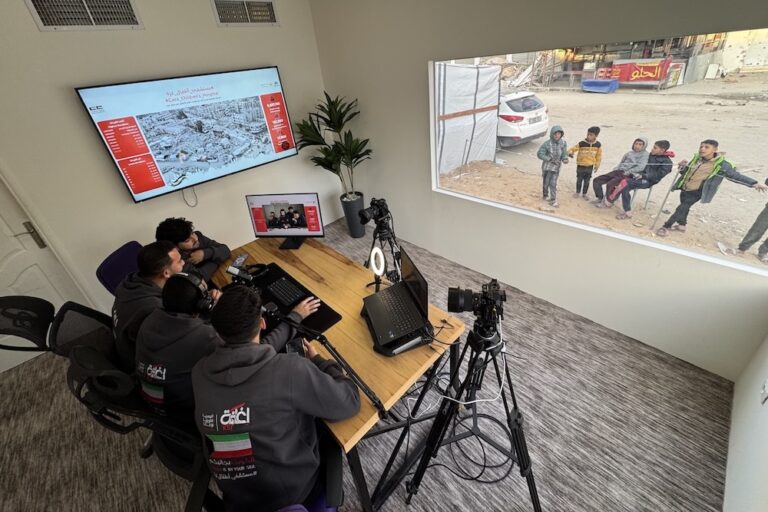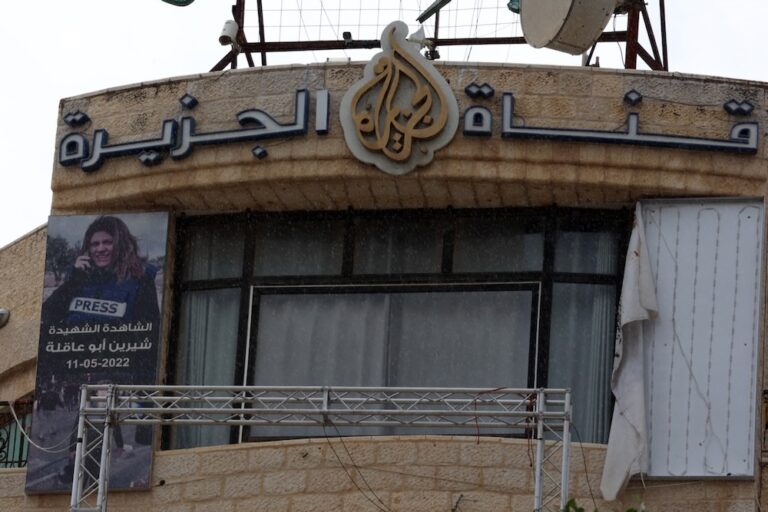Despite his imprisonment, cartoonist Mohamed Saba’aneh continues to speak out for Palestinians with his art.
The Palestinian cartoonist Mohamed Saba’aneh is paying the price for expressing his opinions through his cartoons with a five-month sentence in an Israeli prison. Yet this violation on his freedom of opinion and expression did not stop him from fighting for what he believes in. After 3 months since his arrest, Al-Hayat Al-Jadida has published a new cartoon by Saba’aneh on its front page which he sent from Al-Naqab prison in the Negev Desert.
I met Saba’aneh’s wife, Athaar, about a week before the cartoon was published, and she confidently told me: “I am sure Mohamed is drawing while in prison, he doesn’t like to waste time. When he would come home after his day at work at Al-Hayat Al-Jadida newspaper, he would go to his home office and spend hours drawing.”
Athaar last saw her husband in court on 4 April 2013, and has had no communication with him since. She still awaits permission to visit Saba’aneh, and so far none of his family members have been able to visit him. “I miss him a lot, and my life has changed tremendously, His face was pale the last time I saw him,” says Athaar. “When I approached him he asked me if his drawings were being published in the newspaper, and to deliver a file containing cartoon drawings that he never published before.”
Saba’aneh began drawing since childhood, but his talent flourished in his college days until he started his career as a cartoonist at Al-Hayat Al-Jadida, where his drawings were published daily on a dedicated section of the newspaper. “He is eager to fight injustice through his drawings, and will never be silenced” added Athaar with a smile, but with a hint of sorrow in her eyes. “I can’t tell you how much we would argue because of his strong commitment to his work – when I would walk in to his home office he would accuse me of distracting his thoughts.”
Saba’aneh’s mother had a huge role in nourishing his artistic talent. She used to collect the drawings by the late Palestinian artist Naji Al Ali, and according to his friend Mohamed Abu Azeza, Saba’aneh used to study them as a child. “The social environment surrounding [him] during his upbringing played an important role in broadening his artistic sense” says Abu Azeza, who has known Saba’aneh since 1997 and has worked with him for six years. “Mohamed is a practical guy and not romantic, but he is full of an enormous amount of emotion which he expresses with anger and criticism.”
Saba’aneh, or “Saboo” as he is known to friends, earned a reputation among Palestinians for channeling the suffering of people and their daily struggles through his cartoons, particularly through “Abu Fayek“, a character he invented in 1998 based on his grandfather Fayek Saba’aneh, who he saw as the archetypal Palestinian.
Several months before his arrest, Israeli websites such as Palestinian Media Watch accused Saba’aneh of being an enemy of Israel because of his cartoons, which recently have focused on the hunger strikes of Palestinian prisoners, as well as internal Palestinian issues such as the rise of commodity prices, the conflict between Fatah and Hamas, and the Palestinian Authority’s inability to pay staff salaries. His last cartoon while still a free man was published on Valentine’s Day.
Saba’aneh’s arrest was received with concern by Palestinian freedom of expression institutions, such as the Palestinian Center for Development and Media Freedoms (MADA), which has organised demonstrations and protests in collaboration with the Ministry of Information, the Journalists’ Syndicate, and Al-Hayat Al-Jadida. International reaction has also been expressed by the Committee to Protect Journalists (CPJ), Reporters Without Borders (RSF), and the Cartoon Movement.
Palestinian artist Ahmed Dari dedicated a song to Saba’aneh, “Saboo’ ya Saboo’ ur pen is not allowed“, and many cartoonists dedicated drawings to him. His friend Marwan Jabir runs a Facebook page, “Freedom for Mohamed Saba’aneh“, and his wife follows and archives everything that’s published regarding her husband’s case. “The local and international solidarity with Saba’aneh helped me overcome this; I continuously receive calls from friends and his colleagues,” says Athaar.
Saba’aneh, who is known for his sense of humor, spent difficult days being interrogated since his arrest on 16 February 2013 until 6 March 2013. He was forced to accept the charges against him for “communicating with hostile parties against the state of Israel”, was put under enormous pressure during that period, and prevented from meeting his family or even a lawyer.
Saba’aneh’s family, friends, and colleagues await his release on 16 July 2013. “I now live in the house alone and I refuse to close the home office until his return, I want everything to look as usual.” says Athaar.
No matter how poignant Saba’aneh’s story is, it should not overshadow the stories of 20 families who are suffering the loss of their sons in the line of duty while covering news in Palestine since 2000, or of those who are still languishing under administrative detention, including Amer Abu Arafa, detained since 21 August 2012, and Waleed Khaled, who spent years detained in Israeli prisons, or Khader al-Zahar, who lost his leg during the last Israeli aggression in Gaza, or Mohamed Othman who became paraplegic after he was targeted by Israeli Forces in Gaza.
The ongoing Israeli violations against Palestinian journalists reflect a systematic plan to suppress freedom of expression and to ensure these violations are not exposed locally or internationally. Mohamed Saba’aneh’s cartoons, which creatively reflect the suffering of Palestinians, evidently upset Israel and he is now paying the price. What raises my admiration and pride are the Palestinian journalists who spread and publish pictures of their attacks, and caption them with the phrase: “and the coverage continues.”
Riham Abu Aita is the Public Relations Officer at the Palestinian Center for Development and Media Freedoms (MADA).



